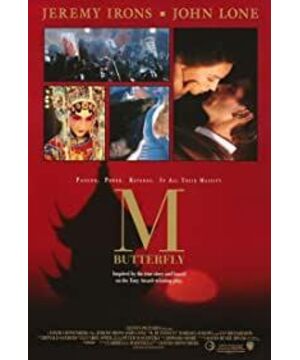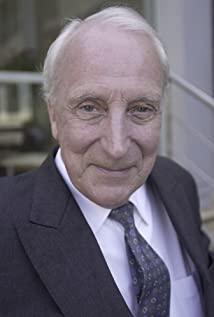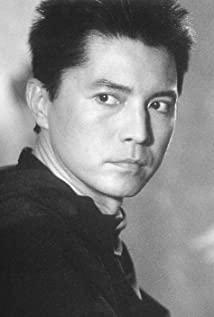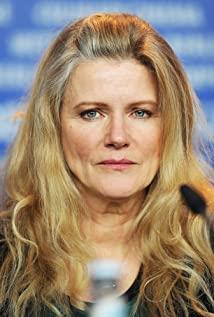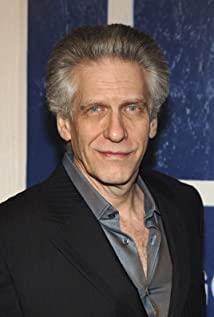[Please do not reprint! ! ! 】
———————————————————————————————
“Mr. Butterfly” by Huang Zhelun was staged on Broadway in March 1988 and won The best drama of the Tony Awards this season, has performed in more than 30 countries. Unsurprisingly, the success on stage caused a large number of companies to bid for its adaptation rights, and David Geffen (the Broadway version of "Butterfly", the owner of Geffen Pictures, which has a contract with Warner Bros.) rejected them. . "Mr. Butterfly" is adapted from real events. It tells the bizarre love between French diplomat Rene Gallimard and Peking opera actress Song Liling: Gallimard does not know that his person in love is actually a male and a spy for the Chinese government-only if they are both. Gallimard was forced to face Song Liling's true gender when he was arrested for espionage.
Probably moved by Cronenberg's persistent interest, Geffen is happy to let him direct the film version under a suitable budget, and Huang Zhelun is also willing to write the movie script. If the director Cronenberg is not satisfied with Huang Zhelun's plan, he can start anew. "I said yes, because I'm a lazy person, and this is his script, don't care about him." According to Cronenberg's team opinion, the budget for this play is set at a satisfactory figure: 17,000,000~18,000,000 US dollars. The remaining questions are all concentrated on the script.
(director:)
I started to discuss the script with Huang Zhelun, telling him what was of interest to me and what was not. In his first draft, there was a branch line about Americans in Vietnam, and some scenes were about dropping bombs in Vietnam. I said: "I'm not interested in these. This play should revolve around two protagonists and how they coexist." Obviously, Geffen's manager thinks the script needs these things to make it cinematic. But we discarded these and started all over again. Moreover, the gender politics in the original script was too simple and standard, and people read this kind of content in newspapers every day: specific imprints of women and gender. I think we should be more subtle, more complicated, and more moving. I didn't see any emotional commotion from the drama version-in the end I saw a stage performance in Los Angeles, which was very explicit to highlight the cartoon-like nature. You seem to be looking at a diagrammatic, several forces rather than a struggle between several people.
I said: "First of all I do not accept your presumption: all people in the Western context are fascinated by Eastern myths. This is too much, you have presupposed the disadvantage of Gallimard; he is obsessed with the opera "Madame Butterfly." , He is a complete idiot, he is also very clumsy in terms of sex. I think this shows that you are not confident in your own presupposition, because from a technical perspective, this presupposition should be effective for any passerby in the Western world , He doesn’t even need to watch "Madame Butterfly"." In fact, the first version of the script started when the young Rene Gallimard was lying on his mother’s lap, watching "Madame Butterfly" and sobbing, while being completely emotional and lustful. Was awakened. I said: "This actually sets it as a special case, but tries to reflect a cultural consensus from it. Why don't we test it: Putting aside the support of "Madame Butterfly", it is assumed that Gallimard has never seen it. "
As you can imagine, some people will accuse me of depoliticizing. I think that the political content of gender and cultural mythology does exist, but it needs to be more subtle to fit my understanding of "what can movies do". In this field, the film is a more sensitive and delicate carrier for me, especially its dialogue, so I must see Rene and Song Liling say these things face to face. In the stage play, they just made generous speeches, and the structure of the script made this even more serious-Rene stood in an advantageous position to review and comment on his life. This is a different matter for the movie script. I thought it was not good, so I revised it later. Gallimard has too much self-awareness, which also comes from the structure of the original stage script.
It is obvious from the playwright’s own published postscript that Huang Zhelun, as a second-generation Chinese-American immigrant, has openly or even fundamentally focused on the cultural, gender, and political dimensions of "Mr. Butterfly". The author read two passages of the real situation of Gallimard (prototype: diplomat Bernard Boursicot) and Song Liling (prototype: Shi Peipu) in The New York Times, which inspired the deconstruction of "Madame Butterfly." What the script teaches-race and gender stereotypes, politics and controversy-conflict with director Cronenberg's political ideas, and more importantly, the directors also have different understandings of the possibilities of the play in artistic practice. The director must turn it into his own story-to infuse more foreign blood, and at the same time, develop the director's inner interest in the story of Huang Zhelun/Boursicot/Gallimard: the desire and possibility of "transformation" in the body and spirit .
(director:)
I remember when I received the second draft of Huang Zhelun, I got goose bumps and understood a lot. I don't intend to analyze why, if I really do this, I will become a critic. But the thought of "transformation" lingered in my mind. The scene about Dragonfly was created by me, not in Huang Zhelun's script, nor on stage play. I put this scene into the movie, and it is perfect, subtle and obscure to me: the appearance of the dragonfly is the result of "transformation." I think Gallimard inadvertently responded to this, he "transformed" himself into something we don't understand. The idea conveyed by this idea is: reality is created by people, and there is no other reality for us. Gallimard is creating a reality for herself, and for his own reasons, Song Liling assisted him. I think this is a very interesting perspective. I have done it before, but it may not be the way to do it.
At some point my photographer said: "I really miss your original lines." I know what he meant, but this is also the exciting point of this movie. You can’t talk like you do in Naked Lunch or Dead Ringers. I do not intend to abandon the dramatic foundation of "Mr. Butterfly", I hope it has a style of opera and drama. It would be a mistake to abandon these and let the actors speak street language. Because Gallimard was creating his own opera, even though he didn't know it. He created an opera for his life and wanted to be its protagonist. So I thought of this kind of "semi-theatrical" dialogue. You might think that "no one talks like that", but at the same time you think that "although they don't, they should say that in this movie." Let Song Liling say these maxims, especially when you realize what her purpose is and how she helped Gallimard create their romance and fantasy. This should be dramatic, not realistic.
There is a scene where Song Liling sits on the bed and says: "I despise these clothes and all these bourgeois depraved things, but for the great helmsman, I am willing to do this." Being forced to be a homosexual, and of course also falling in love with this identity, Need and desire all of this, and at the same time be humiliated by all of it. This interesting concoction is built into the script, not my personal invention. This is very resonant-being forced to do something you desire, you crave it almost desperately, but it is bad, unless you are forced to do it. However, just like in the script, we didn't walk into Song Liling's heart. We didn't see much of what she would do when she was alone in the room.
I think this is part of the "transformation" theme. People want to be forced to do it. I'm not just talking about sex, it's just one of the hidden lives we can achieve. Their secret life hints at the possibility of transformation: allowing you to become another kind of person, and release your true colors, your past, your culture, your emotional life, and everything else. This is a terrible and extremely tempting thing.
Cronenberg let Jeremy Irons play Gallimard. For the first time we saw Cronenberg's actor appear again in other stories, creating a strange, frightening, and surprisingly resonant effect. Do Cronenberg's heroes live only in a hidden hell under a specific narrative? They have neither life nor future, beyond the embarrassing fate or apparent self-destruction. As long as the sight of Irons appearing in China-exactly like his amazing performance as Elliot and Beverly at the Mantle Clinic (see "Dead Ringers")-it creates a sense of anxiety and imminent danger. A Cronenberg actor occasionally breaks into the real world, and we can already expect his worst situation.
(director:)
In this movie, Jeremy is a combination of Beverly and Elliot, more like Beverly. Just kidding. Speaking of these scenes and how to interpret them, it is often very interesting if there is a history available for review. It operates in the same way as your photographer and work team. You never get bored with each other, because you are challenging each other: not a challenge to yourself but a challenge to work. This is very effective. This is why we have to do things according to budget, and we cannot spend a lot of time and money on our own affairs. We seem to be doing a mobile operation-very nervous and efficient. The people I work with have a lot to do, including my cruelty to the script. In fact, even though this is my highest budget, it is still very tight. I don't want to lose this vital feeling.
Of course, to a certain extent, this is a completely different movie, but I think, "Jeremy and I will get tired of each other, and because we are familiar with each other's way, will we no longer exert our best ability?" No, I think there is still enough tension and keenness between us, both comfortable and tense, we don't take anything for granted. This is dangerous enough. Of course, Zun Long is also a strong presence in the shooting. There are a lot of interesting things between Zun Long and Jeremy, they quickly changed everything, because in Dead Ringers it was Jeremy who played against him, and there were no others. To some extent, Zun Long is another version of Genevieve Bujold in Dead Ringers. He meticulously became a woman during the filming process, and he hoped that Jeremy would not even see him as a man. He was completely transformed into a perfect woman during the filming. If you want to look at femininity, then look at him.
"Butterfly" is actually Cronenberg's first film shot outside of Canada. It has been filmed in four countries: China, Hungary, France and Canada, from early August to December 1992. The trailer was handed over to Warner to arrange the film before the feature film was completed, but it caused an unexpected shock. Cronenberg maximized the film’s landscape and crowd scenes, and seemed to want to make it into a film of epic scale and perspective. But in fact, what emerged from the movie itself-Cronenberg's highest achievement in the first overseas scene shooting, was his determination and means to surrender the scene. Almost in an anti-David Lean approach, the enchanting beauty of the Great Wall of China seems to be used to carry the intimate and delicate emotions. It seems that Rene and Song Liling personally designed this scene, rather than wandering in the middle of nothing and inadvertently participating in the action triggered by such a large spectacle.
(Director:)
When David Geffen saw the trailer, he said, "This is in the movie? Are we selling things that are not in the movie?" I said, "No, all these shots are from the movie, but It's not David Lean's type of film." I joked that this is my first David Lean-style movie, because this is what the trailer looks like, an epic like "Doctor Zhivago". But in fact it is obviously not. Warner was shocked. They said, "You made a movie that we have been relived all the time! God, 17 million dollars made an epic of 50 million dollars!" So they were very excited. My excitement is that I made a movie with a small amount of money, and everything I feel is completely metaphorical in the movie.
I don't want to make a movie like The Russia House, that is a lesson. It was not very successful artistically, because it was full of fascination with the view of Leningrad’s streets. When you only want to look at the face of the actor, the camera turns out the window. I can't believe how frequently the camera shifts with steadicam in order to take pictures of the onion-shaped domes of buildings. I was thinking: "God, I don't want to make such a mistake." The things in "Mr. Butterfly" are where they are. However, I still hope to capture the scenes of the back streets and alleys in Beijing, because I have never seen them, not Tiananmen Square or the Forbidden City. I don't want to be a tourist, but these buildings fit in the movie because Gallimard really fell in love with China.
When the scene switches to Rene and Song Liling at the Great Wall, the audience can take a breath. But the moment of relaxation ended after a close-up of Song Liling, where there is no 360-degree display of the majestic landscape, and the Great Wall is not an ornament. Gallimard was seduced by the Great Wall and Song Liling there, but he perceives more than the audience. It was he (not the audience) who was intoxicated by the scene at the time.
When filming Scanners and Rabid, there were a lot of street scenes, unimaginable low budgets, gunfights, tanks, explosions, crashes, these are all incredible in the location (for me, Montreal is the location, I don’t call it home) . So this is just the same problem again: how to make it serve the movie? This is actually not a problem, of course, basically this movie is an indoor scene for two people.
The former name of Dead Ringers was Twins, until it was discovered that it had the same name as Ivan Reitman's movie. Naked Lunch had to compete with a group of similar author-themed movies (including Stephen Soderbergh’s Kafka, and the Coen brothers’ Barton Fink). During the production of "Butterfly", Neil Jordan’s The Crying Game came out, "I’m simply Can't laugh or cry." Cronenberg described his own reaction at the time. Jordan's movie describes an IRA member (Stephen Rea) who initially kidnapped and was about to execute a black British soldier, and then fell in love with his girlfriend, only to discover that this girlfriend (Jaye Davidson) was in fact a man. This is like a small bomb detonated after the clues of gender conversion in "Mr. Butterfly". Not only that, this small-cost British film has caused an unexpected sensation in the American film market.
(Director:)
When you start making a movie, it is like revealing a certain energy in the universe, and then this special energy starts to explode in various places and independently. Nowadays, there are movies about transvestite everywhere, and I want to wait for our movie to launch, there will be at least ten similar movies. It would be great if a movie is made but there is no other movie that has even the slightest far-fetched resemblance to it.
We will never know what the fate of this movie would be without The Crying Game. I think they are unfortunately similar to each other. I say "unfortunate" because now you can't exclude The Crying Game from viewing this movie. The Crying Game tells about the love of two men-one of them doesn't know the other is a man-a sweet and innocent feeling, but in a strange situation, it seems to be non-threatening. To my surprise, even among middle-class heterosexual men, a considerable number of people love this movie. In contrast, I seem to have become a demon, but I think this is because she (Jaye Davidson) is too much like a woman, even though "she" has male genitals. In one shot, she had her short haircut. You should think "oh my goodness, she looks like a man", but in fact it doesn't, because she looks more feminine with short hair. This is why I chose Dragon Dragon (rather than someone similar to Jaye Davidson) to perform. I don't want to see an anonymous actor who is perfectly feminine, like a drag queen, I want a man. When Gallimard and Song Liling are kissing, I hope these two men are kissing, and I hope the audience can perceive this. Therefore, our movie is much more open and honest than The Crying Game, which uses unknown newcomers without wanting to disclose this at all.
I have auditioned some transgender people, they are too feminine, unless you see them naked you can believe that they are men. They are too perfect. I observed one of them, a British/Chinese "woman" in a videotape, and I said: "She is not a man. She is completely a woman." At that moment I realized that this was not the effect I wanted, because You have to strip the woman naked, and then focus the lens on her crotch to let the audience know that you are not a different person. This is a wrong kind of fraud, especially when I see a group of candidates: their women's dresses are convincing, but they have no impact in the court scenes, and they have no impact in the prison scenes—it seems to be either Either the little boy is still a woman, which is wrong. "Butterfly" is a film about transformation for me, which is what attracted me to do it. There must be a transformation to become a male. If you find such a perfect woman to do it, you will not be able to transform them.
Only when Jeremy gets enough things as a synergy, the film will be convincing-Rene Gallimard has enough femininity to coordinate with him, so he can create an illusion of feminine characteristics. I don't want to turn him into a complete fool. I hope the audience understands why he didn't see through the truth. At the end of the movie, you should realize that there is a will: He decided not to accept the fact that Song Liling is a man. He has his own reasons. The reasons are many and complex.
There are many parallels between "Butterfly" and The Crying Game, not only in terms of transgender, but also in terms of cross-racial and cross-cultural. They all occur in a politically hot environment. So there are many places for comparison, but they are still very different. To some extent, my opening remarks were probably due to the reaction of The Crying Game. To my comfort, the people at Warner Bros. looked at it and said, "We think you made a fuss. You should forget about it. That's another movie. You should invest in this one. It has its own life." "
That opening remark" refers to an attempt by Cronenberg in a trial screening to narrow down the audience's potential problems with accepting John Long as a woman. This ability still shocked the audience after revealing the same mystery as The Crying Game. That opening remark made an attempt: leak the answer to the audience in advance and tell them that Song Liling is actually a man. But the results of the screening showed that acknowledging this certainty to the audience did not really give them the relief they needed. The audience is still disturbed by the tenderness and physical love between the two men (the latter is absent in The Crying Game). That opening remark, whether or not it was designed to exhort the audience in the "post-The Crying Game era" of their expectations for revealing the truth, preserved the more subtle themes of "Butterfly". The main purpose of this is that Jeremy Irons's expression when he first saw the men's Song Liling at the trial may be more expressive.
(director:)
We performed a lot of content in that face close-up. One of them was: "Why is she dressed like this? Why is she pretending to be a man?" A short smile, then a moment of confusion, and then this feeling: "I know it anyway, but I don't want to know." This is very complicated. This is why "Butterfly" is not as mainstream as The Crying Game in a weird perspective, although you may think The Crying Game is the more marginal one of the two.
Later we realized that "Mr. Butterfly" made the middle class more uneasy on gender issues. It delights me artistically, but frustrates us in business. I naturally hope it can get a high box office, because I want people to see it; but on the other hand, I did not give in to some of the predicaments that I avoided in The Crying Game. For example, the role played by Stephen Rea should have executed the black soldier, and he should be shot. This would have made the movie more impactful, because then his guilt would be deeper. Asking him to hunt down that person in the movie and then let that person be run over by a tank is almost a Hollywood approach: "We don't want the audience to dislike the protagonist of the movie." And I don't want Gallimard to become too much. Pitiful.
There is a theme in the film about "Do as the locals do." Gallimard is dissatisfied with his own culture, thus abandoning his own culture and immersing himself in another culture. This approach is a kind of self-rejection: just as some people learn another language, marry a spouse of a different language, completely abandon their own culture, their parents, relatives and friends, and their own life trajectory to invest in another culture. This is just an illusion, because the culture you later accepted is not your own. You will always be an outsider, especially for cultures like China and Japan. There is no melting pot spirit there, and they don't want you to become Chinese.
This is also present in the movie, where the disgust of self and culture coexist. But because we are not looking at Gallimard's lonely past, we are looking at a process rather than a mental state. The desire for "transformation" becomes a complete other. We realize it culturally on the one hand, and we realize it from gender on the other hand.
If this story is about suppressed homosexuality, it is oversimplified. If this were the case, there would be no suicide in the way that ended, and Gallimard would not admit that he was that woman. This is complicated and unfamiliar, but I think the basis is his compromise with his sexuality. I don't know, if I break away from the original script and make a movie, maybe I won't get closer to the true story in this respect. When Gallimard's prototype first met his Song Liling, Song was wearing men's clothing and was introduced to him as a Peking Opera male Dan. Song was a very feminine man in a suit and did not wear a skirt. They became very close friends. At some point a year later, Song Liling, who was a close friend, said: "I really fall in love with you. You can have sex with me. We can be lovers instead of just two men. My mother I want a son, because only sons are cherished in China. After she had given birth to a bunch of daughters, she said that I was a boy and raised me as a boy, but I was actually a woman." Song Liling seemed to feel that To: The real Gallimard fell in love with him, but he did not accept himself coming out and being a gay couple with Song. Song had to create a woman for his Gallimard, which is really an interesting story. Without Huang Zhelun's drama, I might be more interested in this version, but in doing so, the story becomes just about suppressed homosexuality.
"Butterfly" finally based on a scene. After the trial, Rene and Song Liling ride through Paris together in a prison car: Rene is on the way to the prison, and Song Liling is on the way back by plane. This provides the character and the audience with the only opportunity to reach a reconciliation and understanding. Rene must face Song Liling's biological sex. In The Crying Game, the character played by Stephen Rea vomits when he sees Jaye Davidson's sexual organs, and the fooled audience is shocked by his disguise.
(director:)
The last scene of Rene and Song Liling in the prison car was my idea, because I knew that this scene could not happen in prison like a stage play. Song Liling obviously would not be allowed to take off her clothes and yell outside Gallimard's prison without no one to stop her. And when it appears as a kind of memory on the stage, there is no problem. I still have some concerns about putting this classic movie scene in a prison car. But where else can you put it? It is set between the court and the prison. We did not shoot in a real prison car, it was almost a gamble. This scene is a favorite of many people. Thankfully, it succeeded. It is still a scene of two people in a room.
I don't want to show Zunlong's sex organs, because this makes the whole scene unfold around the sex organs. I think the key is that Jeremy saw it in an instant. That's enough. I don't think the audience needs to see it. This is very different from The Crying Game, because you have to see it, otherwise you would never believe that Jaye Davidson is a man. The nudity (not the sexual organs) in this scene is very important, because Song Liling said: "Feel my skin, it is still the same as the original." To a certain extent, he is not trying to show himself and the imagined Song Liling How big a difference is, but to show how consistent they are.
Song Liling is such a creation: fictitious male, female, east, and west. When Song Liling was no longer the image they created together, she still mustered up the courage to sob to Gallimard in the prisoner car scene: Although it can't compare with the image they created together, he still wants to love it. This is actually very applicable to many general relationships. When the suppressed doubts collapse, many of the things you created together will no longer exist, and many marriages are broken because of this. You know each other well, but you don't like the truth you see because it is far from satisfactory. So you broke up to create something else with others.
"Only a man knows how to act a woman." This is the line of the script, and it is what I want to show. The concept of female gender was created by men, and the gender characteristics of each other are also illusions created for each other by consensus between us. This is fascinating in one sense, and terrible in another sense, because it means that there is no authenticity about gender to a certain extent, and there is no pure masculinity and femininity. Traits. This is the premise of Crimes of the Future: When women are absent, men will discover masculine and feminine qualities among them, and maintain a certain balance. I believe that you can create a story about two men or two women, and the characteristics of men and women will also emerge in it.
In Naked Lunch, Cronenberg also played a game on the relationship between homosexuality and spies: Bill Lee was "forced" to use hallucinogens to put on the disguise of homosexuality in order to covert activities in Interzone. However, in Cronenberg's concept, this provides a unique solution to Burroughs' authenticity orientation; and some problems applicable to Naked Lunch are also inherited in "Butterfly". This time, the insecticide that Bill Lee imagined became a very real butterfly monarch Song Liling, who manipulated the Burroughs counterpart Rene who was not sure of her gender identity. But compared with Interzone, which is changing its virtual regime, the political context of "Mr. Butterfly" is very specific.
(Director:)
Revolution is used by people. Here is a perfect example: a person says "I am almost desperate to become something else" and then "I can't have another body, I can't give you another body", but at the same time he wants this Can be achieved, and turn to achieve it internally. This is also the reason why I want to reduce the political content: the politics you see in the film must serve unexplained wishes and desires. All the things about the Red Guards are the past that Rene hopes to eliminate—evilly, fiercely, cruelly, and thoroughly. This is a political manifestation of a very personal impulse. People create politics. Without human desire and madness, there would be no politics, so for me, it's best to let the two come together.
If you do too much in this regard, it will be boring. I try my best to keep them parallel. This is also not so clear in the stage play. I tried to add something to arrange Song Liling more cleverly. Was she a spy before meeting Rene? not necessarily. What a specialized spy—a Peking opera actor in disguise! This is how I told Zun Long. When Song Liling met Gallimard, she spoke in a usual or even sarcastic tone. When she saw him put on a sleeve, she led him away from the embassy staff to prevent others from breaking through her man. Body, and then see how far this can go. She was so satisfied and excited that he was tempted to fall in love with herself. Then she was captured by him. That's why I want to include that shot—Song Liling's maid, Shufang, peeping at them from the window—it was added temporarily during the shooting. I hope to imply that she reported on Song Liling, and Song became a spy because of this, otherwise she will be subjected to harsh reeducation through labor because of her homosexuality. So she was able to participate in the political game, in order to be complete. In any case, she was forced to do what she wanted to do, but it had additional conditions.
Finally, the Red Guards came on stage, they were another force entirely. This is not very familiar to Americans, so I added this line: "Now all artists are considered criminals." This voice was conveyed from the loudspeaker to the labor camp. I also added a voice-over: A drunk man was talking about a leftist student in a Paris bar. The people in Paris are confused about what the Chinese are doing, they don't understand. Of course I realized, how would they understand? They live in Santa Monica, about 20 years old and don't care about anything. This change shows that this newly emerging political force will never condone Song Liling. The old regime decayed and only saw this scourge happen, but the new regime would not, unless it was used as a stopgap measure. What she did was too depraved, so she had to be sent to a labor camp.
The success of "Butterfly" among the audience basically depends on whether they can accept this concept: Gallimard is shocked by "Song Liling is a man" at least on a certain level. This is easily accepted in the form of theater, but the movie version leaves an unavoidable problem: how to make the setting, characters, and behavior more concrete and real. Real historical information seems to show that Boursicot and Shi Peipu lived together for 20 years. In his 1986 trial, Boursicot insisted that he leaked the secrets for love, not money. He also told the court: "We have to keep this romance secret and often live together in the dark. This is what I made the mistake. I have never seen his sexuality completely. He is very shy. I think this is a Chinese tradition.”
And Cronenberg not only confronted the matter, but also made Gallimard played by Irons a married man with sexual experience. Men (not Boursicot who met Shi Peipu when he was only 20), this typical Cronenberg feature makes the film's presuppositions more conflicting. They had sex in a dark room, and the camera glanced over, which made the scene even more challenging.
(Director:)
When you see the prisoner car scene, I think you have expected more things to happen. When I was young, I had an amazing idea-maybe you took a prostitute, and she was a man. Now this idea seems to have been forgotten by me, but in fact it is everywhere! It's almost impossible to find a prostitute who looks like but is actually a woman. I think it’s really a bad thing if the audience doesn’t accept Gallimard’s apparent stupidity: they think it’s like an inoperable machine, then you’re in trouble. But if they can manage to make it work in their heads, it's not bad. To some extent, I deliberately removed this protective net-I put aside all the limiting factors about Gallimard’s sluggishness and awkwardness. These factors would make you believe that he might be deceived, then I won’t Played with Jeremy, because it is hard to convince him to be deceived on the screen. Now I just want Jeremy to show it, because you can feel a kind of doubt that was deliberately shelved. He is not being fooled, but he wants to be deceived.
I am often surprised by people’s interpretations. They can’t believe why Gallimard is so ignorant of Song Liling’s true gender, because they take it for granted that they have to have vaginal sex because this can satisfy a man, so how could he not find out? People are not even willing to consider that they can have anal sex. I think Gallimard’s true prototype would still deny this, and argued that he had intercourse between Shi Peipu’s thighs. I was thinking, "Yes, it's between the thighs, plus the hands and mouth." I emphasized more. Song Liling fabricated a fake Chinese culture, a fake ancient Chinese method of making love, and did it beautifully and attractively. In that little scene, they had sex in a dark room-I don't know what to call-she did it with her hands? Or between her thighs? Or anal sex? Where is it? I think people have to accept: how weird people actually are. In the Victorian era, it is not surprising that a man would have not seen his wife's sex organs after 20 years. Human sex is a powerful force: it is separated from the function of reproduction, so it looks almost a seductive force now. There is too much content to explore, it is an art form in itself.
———————————————————————————————
[All are subject to the original text, please do not reprint]
View more about M. Butterfly reviews


